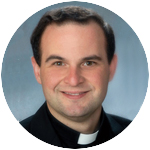
Father Eric J. Banecker
The last in a four-part weekly series on the moral teachings of the Catholic Church, “Called to Holiness and Mission: Reflections on Christian Moral Living Today.” See part one: The Splendor of Truth: How to live by learning from God; part two: How laws, natural and divine, guide us toward the good; and part three, Let your (well formed) conscience be your guide
***
“Bless me, Father, for I have sinned. It has been 30 years since my last confession.” I cannot tell you how awesome and inspiring it is to hear these words. As a priest, there may be no single moment more consequential, no interaction more profound, than welcoming back to full communion with Christ and his Church one who has been, like the Prodigal Son, in a “distant country.”
Of course, it is not just those returning to the practice of the faith who may have been away from confession for a long time. Sometimes, regular churchgoers can go years or decades without celebrating this sacrament of God’s mercy and forgiveness. At other times, people may go to confession with some regularity but then at a time such as a retreat make a truly heartfelt and comprehensive confession.
No matter the situation, I am always humbled by the gift of being a priest in these moments, recognizing that in the sacramental encounter it is truly Christ ministering to his people and extending his mercy through my words and gestures.
[hotblock]
The Synoptic Gospels contain the famous story about a day when Jesus was preaching in a house that was packed with people. Four men brought their paralyzed friend on a mat. Unable to get through the door, they go up to the roof and let their friend down on his mat and lay him right in front of Jesus. Jesus turns to him and says “Child: your sins are forgiven” (Mk 2:5; cf. Mt 9:2-8, Lk 9:13-16).
This, of course, prompts the indignation of the Jewish legal scholars. What a bold and brazen thing to say! Sin obviously has social implications, but it is first and foremost an offense against almighty God. Therefore, only God can forgive the sin of a creature. In making this statement, Jesus was claiming to speak in the very person and with the authority of God himself. We can see why they were annoyed!
But knowing what they were thinking – those words were not spoken off the cuff, after all – Jesus asked a question: “which is easier, to say to the paralytic ‘your sins are forgiven,’ or to say ‘Rise, take up your pallet and walk’” (Mk 2:9)? He then carries out the physical miracle which he explicitly says was his demonstration of a spiritual reality, namely that “the Son of Man has authority on earth to forgive sins” (Mk 2:10).
All those who were the recipients of Jesus’ miracles at some people got sick, grew old, and died. But this spiritual power of forgiveness of sins – of which the healing of physical paralysis was a powerful sign – is much greater, more urgent, and has an eternal effect on our existence.
Yes, God has given authority on earth to forgive sins in his name. During our Lord’s public ministry, this authority was concentrated in him. But after his atoning death on the cross for our salvation, that authority was shared with his chosen apostles when he said, “Receive the Holy Spirit: if you forgive the sins of any, they are forgiven; if you retain the sins of any, they are retained” (Jn 20:22-23). This was a command uniquely given to the apostles.
As Catholics, we believe that this authority to forgive sins has been transmitted to the successors of the apostles, whom we call bishops, and to the co-workers of the bishops, whom we call presbyters or priests. Therefore, in an amazing way, Jesus, the Son of God, continues to forgive sins on earth even to this day, through the ministry of priests and bishops, who by ordination are able to speak with the very “I” of Christ: “I absolve you from your sins in the name of the Father, and of the Son, and of the Holy Spirit.”
My dear friends, everyone should know that sin never has the last word. The last word, the definitive word in our individual lives and in the history of our world, belongs to Christ. Because of this, we should never hesitate to reach out to him in love through the sacrament of penance and reconciliation. As Dante’s “Divine Comedy” reminds us, our decisions here on earth have eternal consequences.
Therefore, let us choose Christ while we have the opportunity to do so! We can say “yes” to his truth about the human person and to the gift of our redemption through his Paschal Mystery. The grace of this sacrament transforms the hearts of those who enter into it with humble and contrite hearts.
Unworthy minister though I am, I am always inspired by the sincerity of those who seek God’s forgiveness and the grace to begin again. He will never refuse us, nor will he abandon us if we truly seek to live according to the Church’s teachings, which are his own.
***
Father Eric J. Banecker is pastor of St. Francis de Sales Parish, Philadelphia.
PREVIOUS: Pray with united hearts for peace in Ukraine, Europe, the world
NEXT: From our broken world, ordinary heroes emerge



Share this story